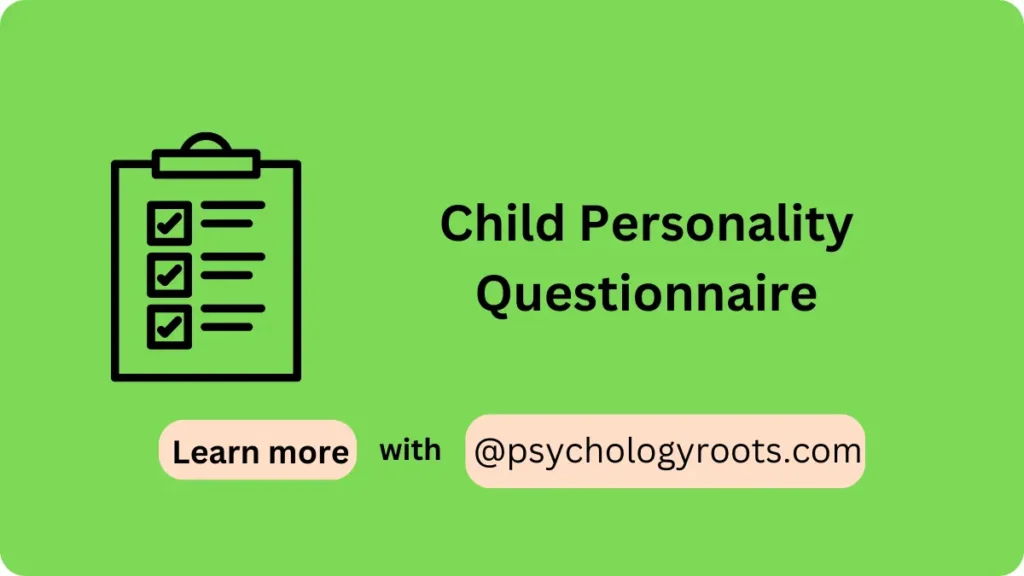Table of Contents
Child Personality Questionnaire
Here in this post, we are sharing the “Child Personality Questionnaire”. You can read psychometric and Author information. We have thousands of Scales and questionnaires in our collection (See Scales and Questionnaires). You can demand us any scale and questionnaires related to psychology through our community, and we will provide you with a short time. Keep visiting Psychology Roots.
About Child Personality Questionnaire
Scale Name
Child Personality Questionnaire
Author Details
Rutherford Burchard Porter & Raymond B. Cattell
Translation Availability
Not Sure

Background/Description
The Child Personality Questionnaire (CPQ) is a personality assessment tool specifically designed for children aged 8 to 12 years. The CPQ aims to measure various personality traits in children, offering a comprehensive analysis of their psychological makeup. This tool is based on Cattell’s 16 Personality Factor Model, which has been adapted for younger age groups. The CPQ provides insights into a child’s behavior, social interactions, emotional stability, and cognitive styles. It is often used by psychologists, educators, and researchers to identify potential issues in a child’s development or to understand their personality for educational or therapeutic purposes.
The CPQ contains a series of statements that the child is required to respond to, with responses indicating different levels of agreement or disagreement. These responses are then analyzed to determine the child’s personality profile across several dimensions. The questionnaire is grounded in Cattell’s trait theory, emphasizing the importance of quantifiable traits in understanding personality.
Administration, Scoring and Interpretation
- Preparation: Ensure that the child is comfortable and understands the instructions.
- Questionnaire Distribution: The CPQ can be administered individually or in a group setting. The child is asked to respond to a series of statements, usually in a written format.
- Response Recording: Children are typically required to answer on a Likert scale, indicating the degree to which they agree or disagree with each statement.
- Scoring and Analysis: The responses are scored according to specific guidelines, and the results are analyzed to create a personality profile.
Reliability and Validity
The CPQ has undergone extensive testing to ensure its reliability and validity. Studies have shown that it is a consistent and accurate measure of child personality traits, correlating well with other established personality assessments. The CPQ has demonstrated good internal consistency and test-retest reliability, making it a trusted tool in psychological evaluations.
Available Versions
70-Items
Reference
Cattell, R. B., & Coan, R. W. (1957). CHILD PERSONALITY STRUCTURE AS REVEALED IN TEACHERS’BEHAVIOR RATINGS. Journal of Clinical Psychology, 13(4).
Important Link
Scale File:
Frequently Asked Questions
. What age group is the CPQ designed for?
The CPQ is designed for children aged 8 to 12 years.
How long does it take to complete the CPQ?
It typically takes about 30-45 minutes to complete.
Can the CPQ be administered in a group setting?
Yes, the CPQ can be administered individually or in a group.
What areas of personality does the CPQ assess?
The CPQ assesses various personality traits, including emotional stability, social behavior, and cognitive styles.
Is the CPQ a reliable assessment tool?
Yes, the CPQ has been shown to have good reliability and validity through extensive research.
Disclaimer
Please note that Psychology Roots does not have the right to grant permission for the use of any psychological scales or assessments listed on its website. To use any scale or assessment, you must obtain permission directly from the author or translator of the tool. Psychology Roots provides information about various tools and their administration procedures, but it is your responsibility to obtain proper permissions before using any scale or assessment. If you need further information about an author’s contact details, please submit a query to the Psychology Roots team.
Help Us Improve This Article
Have you discovered an inaccuracy? We put out great effort to give accurate and scientifically trustworthy information to our readers. Please notify us if you discover any typographical or grammatical errors.
Make a comment. We acknowledge and appreciate your efforts.
Share With Us
If you have any scale or any material related to psychology kindly share it with us at psychologyroots@gmail.com. We help others on behalf of you.